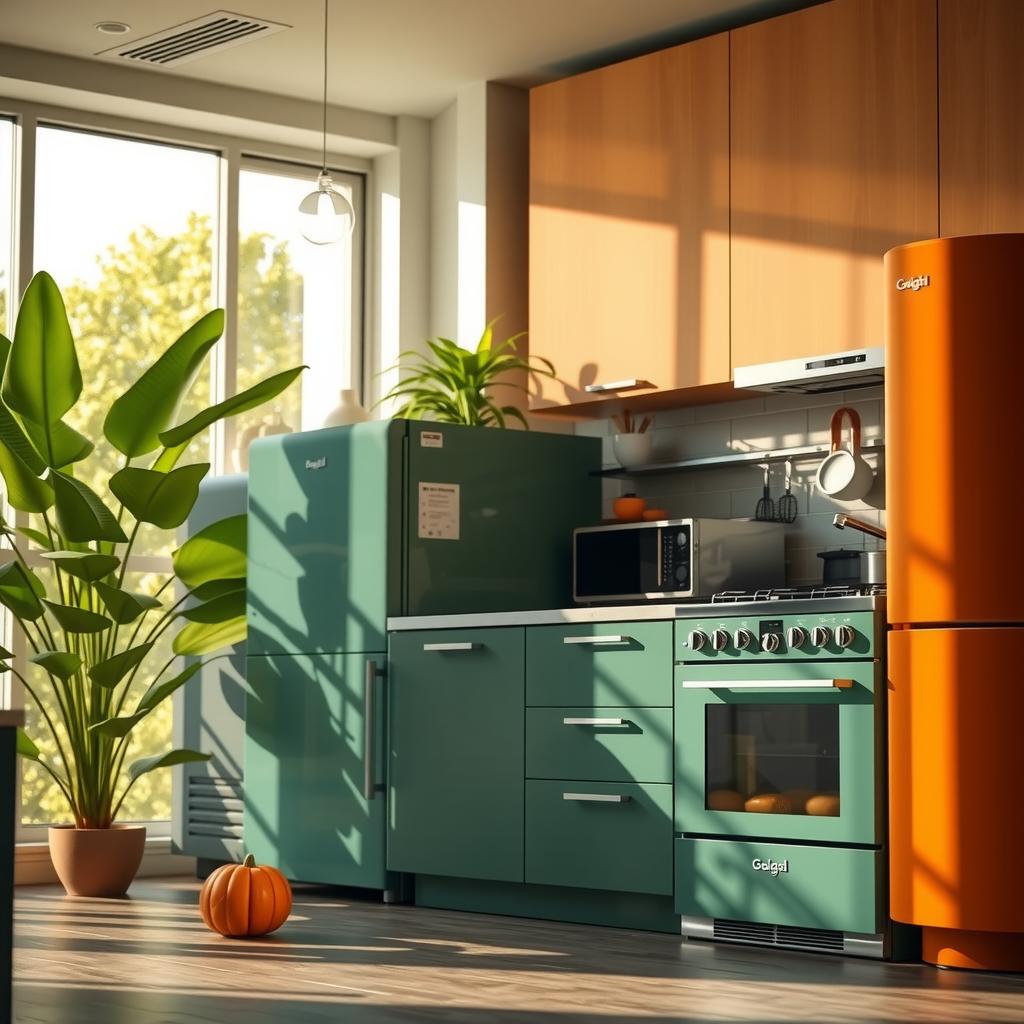In today’s world, where rising energy costs and environmental concerns are at the forefront of many homeowners’ minds, understanding energy-efficient appliance ratings has never been more crucial. Have you ever wondered how some appliances claim to save significant amounts on your monthly energy bill while others don’t? This blog post aims to demystify the often-overlooked labels that adorn household gadgets—from refrigerators to washing machines—and explain why they matter for both your wallet and the planet.
As consumers increasingly seek out eco-friendly appliances, distinguishing between mere marketing claims and true efficiency can be overwhelming. The truth is that knowing what these ratings signify can empower individuals to make informed decisions about their home energy use. Armed with this knowledge, readers will not only learn how to evaluate which products genuinely promote sustainable living but also discover practical tips on how to reduce energy costs effectively.
By exploring various rating systems and certifications used globally, this article will guide readers through essential concepts such as Energy Star ratings, EU energy labels, and more. It will highlight key features of efficient appliances while providing insights into how these choices contribute positively toward reducing one’s carbon footprint.
Moreover, the discussion around energy-saving tips connected with appliance selection is vital in fostering a comprehensive approach towards greener households. Readers can anticipate learning about smart shopping strategies that lead them toward investing in long-lasting quality rather than just low upfront costs.
So if you’re ready to take steps towards maximizing efficiency at home while minimizing environmental impact—join us as we delve deep into the world of appliance ratings and uncover actionable solutions designed for a sustainable future!

Key Insights:
-
Understanding Energy Efficiency Ratings: Grasping the various energy efficiency ratings is essential for consumers seeking to make eco-conscious decisions. These ratings offer a standardized way to compare appliances based on their energy consumption, allowing individuals to select options that not only reduce energy costs but also support sustainable living practices. By familiarizing themselves with these evaluations, consumers can identify products that genuinely contribute to lowering their carbon footprint.
-
Decoding Appliance Labels and Certifications: Navigating through the myriad of labels and certifications can be daunting; however, discerning which symbols indicate true eco-friendly performance is crucial. Many labels are designed to inform consumers about an appliance’s efficiency, while others may serve as mere marketing tactics. Understanding what each label represents empowers consumers to make informed choices in selecting efficient appliances that align with their values of sustainability and responsible consumerism.
-
Practical Tips for Choosing Energy-Saving Appliances: To effectively recognize truly energy-saving appliances, readers should employ strategies like researching rating systems such as ENERGY STAR and reviewing product specifications carefully. Additionally, comparing similar models’ energy consumption data enables better decision-making regarding home energy use. By implementing these tips, consumers can optimize their purchases towards products that promise both quality functionality and reduced utility bills—ultimately fostering a more sustainable lifestyle without sacrificing performance or comfort in daily life.

Understanding Appliance Ratings
Decoding Labels and Certifications for Informed Decisions
Navigating the world of appliance ratings can be daunting, yet it is crucial for consumers wanting to make informed choices about their home energy use. Energy efficiency labels often feature symbols like ENERGY STAR, which signifies that a product meets strict energy-saving guidelines set by the U.S. Environmental Protection Agency. Such certifications are vital in promoting eco-friendly appliances that not only reduce carbon footprints but also help in cutting down on utility bills over time. Moreover, understanding these ratings empowers consumers to embrace a lifestyle aligned with sustainable living, as many states offer rebates or incentives for purchasing certified products. By choosing appliances with high-performance ratings, individuals take significant strides towards minimizing waste and enhancing their overall quality of life.
The Importance of Energy-Saving Tips
Maximizing Efficiency Through Knowledge
For consumers eager to lower their energy costs while simultaneously contributing positively to the environment, implementing effective energy-saving tips can prove beneficial. One fundamental strategy involves selecting efficient appliances that boast superior performance metrics; these typically consume less power compared to standard models without sacrificing functionality or reliability. For instance, when shopping for refrigerators or washing machines, opting for those rated at least one level above average on the efficiency scale can lead to substantial long-term savings—not just financially but also environmentally by reducing home energy use significantly. Additionally, regularly maintaining such appliances ensures they operate at peak efficiency; simple actions like cleaning filters and ensuring proper ventilation will extend an appliance’s lifespan while optimizing its performance.
Recognizing Key Symbols
A Guide To Common Certification Markings
When examining various household devices and machinery in stores or online marketplaces, recognizing key symbols associated with appliance ratings becomes essential in making educated purchases. Apart from ENERGY STAR certification mentioned earlier, other notable labels include the CE marking (which indicates compliance with European health and safety standards) and UL listings (which signify adherence to North American safety requirements). Consumers should familiarize themselves with these markings since they provide insights into an appliance’s operational safety alongside its environmental impact—helping them choose safer options when considering new installations or replacements within their homes.
The Role of Consumer Awareness
Driving Demand for Sustainable Options
Ultimately, consumer awareness plays a pivotal role in shaping market trends regarding sustainable products and practices related to home appliances. As more people become informed about how energy-efficient options can lead not only to cost reduction but also contribute toward combatting climate change through decreased emissions from typical household activities—a paradigm shift occurs within society towards favoring greener alternatives over traditional models deemed less responsible environmentally speaking. This collective demand drives manufacturers toward innovation focused on developing next-generation technologies designed specifically around sustainability principles—ensuring future generations inherit healthier ecosystems while enjoying modern conveniences made available today.
In conclusion, understanding appliance ratings through various labels helps navigate choices effectively when investing in eco-conscious upgrades throughout one’s living space—all serving as stepping stones leading us further along our journey toward achieving greater levels of resource conservation within everyday life scenarios encountered daily!
The Benefits of Energy-Efficient Appliances
Enhancing Savings and Sustainability in Our Homes
Energy-efficient appliances have emerged as a pivotal component in the quest for both financial savings and environmental preservation. By integrating these eco-friendly appliances into daily life, consumers can significantly reduce their overall home energy use, leading to lower monthly utility bills while simultaneously contributing to a healthier planet. These appliances are designed with advanced technology that minimizes electricity consumption without compromising performance, making them an attractive option for budget-conscious households.
The efficiency of modern appliances is often reflected through standardized ratings such as ENERGY STAR or similar certifications. These appliance ratings provide consumers with clear indicators of which products will contribute most effectively to reducing energy costs. For example, a washing machine equipped with high-efficiency features not only uses less water but also reduces the amount of energy required per cycle compared to traditional models. As highlighted by various studies, replacing older appliances with newer, more efficient alternatives can lead households to save hundreds of dollars annually on their energy bills.
Moreover, adopting these sustainable solutions aligns well with broader efforts toward sustainable living. When individuals choose efficient appliances—such as refrigerators with improved insulation or LED lighting systems—they are taking proactive steps towards minimizing their carbon footprint. This reduction is vital in combating climate change and preserving natural resources for future generations. In fact, it has been estimated that widespread adoption of efficient technologies could lead to significant reductions in greenhouse gas emissions across entire communities.
In addition to purchasing decisions, homeowners can implement practical energy-saving tips that further enhance efficiency levels within their residences. Simple actions like regularly cleaning appliance filters and ensuring doors seal properly can optimize performance and prolong the lifespan of these eco-conscious investments. Furthermore, embracing smart home technology offers another layer of convenience; automated systems enable users to monitor usage patterns and make adjustments remotely—not just enhancing comfort but also reinforcing habits conducive to lower consumption rates.
Ultimately, investing in efficient appliances represents a win-win scenario: families enjoy reduced expenses while fostering stewardship over environmental resources—a critical balance needed in today’s society grappling with pressing ecological challenges. By making informed choices about appliance purchases and maintenance practices alike, consumers play an essential role in shaping a more sustainable future while reaping tangible benefits at home.
Practical Tips for Choosing Energy-Saving Appliances
Empowering Your Purchases in a Crowded Marketplace
Navigating the vast array of appliances in today’s marketplace can be overwhelming, especially when it comes to selecting energy-saving options that truly deliver on their promises. To make informed decisions, consumers should focus on understanding energy efficiency ratings and recognizing eco-friendly appliances that align with sustainable living goals. First and foremost, examining the appliance ratings provided by reputable organizations can serve as a reliable benchmark; look for those labeled with ENERGY STAR certification or similar endorsements. These labels signify compliance with rigorous standards for energy consumption, ensuring products are efficient and designed to reduce home energy use effectively. Moreover, potential buyers should consider the appliance’s annual energy consumption figures—often displayed in kilowatt-hours (kWh)—to compare models accurately.
In addition to checking official certifications and metrics, consumers can benefit from researching product reviews and user experiences which often highlight long-term performance aspects not captured by initial testing alone. It is essential to note that some manufacturers may employ marketing tactics that exaggerate savings claims; therefore, due diligence is necessary when evaluating these assertions against documented evidence from credible sources or consumer advocacy groups. Another savvy strategy involves calculating potential cost savings over time based on an appliance’s estimated lifespan versus its operational costs—this approach allows buyers to visualize how investing upfront in efficient appliances may yield substantial savings down the road.
Furthermore, specialized features such as smart technology integration can enhance an appliance’s overall efficiency by optimizing usage patterns based on actual household habits. For instance, washing machines equipped with load sensors adjust water levels according to laundry size while refrigerators might utilize adaptive cooling systems that minimize power during periods of low demand. These innovations contribute significantly toward reducing energy costs while supporting a commitment to eco-conscious living.
Lastly, it’s important for shoppers to stay updated about emerging trends in sustainable practices within the industry; attending workshops or engaging with online forums focused on green initiatives could provide valuable insights into new technologies aimed at enhancing everyday convenience without compromising environmental integrity. The key takeaway remains: informed choices begin with thorough research backed by solid data regarding both short-term benefits and long-term implications of any purchase related to home upgrades focused on sustainability efforts.
In conclusion, empowered purchasing requires diligence through verification of energy-saving tips, scrutiny of reliable data points concerning performance capabilities of various models available today—all contributing towards fostering smarter decisions leading towards reduced ecological footprints while enjoying modern conveniences at home.
In an era marked by rising energy costs and environmental awareness, understanding energy-efficient appliance ratings has become essential for consumers striving to save money while contributing positively to the planet. These ratings provide critical insights into how appliances consume energy, helping individuals identify products that align with their sustainability goals. By familiarizing themselves with these evaluations, consumers can make informed choices that lead not only to reduced utility bills but also to a smaller carbon footprint.
Navigating through various labels and certifications can be daunting; however, knowing which symbols signify genuine eco-friendly performance is crucial. Common rating systems include ENERGY STAR® certifications and the European Union’s energy label, among others. These indicators reflect rigorous testing standards assessing an appliance’s energy consumption patterns, allowing consumers to differentiate between truly efficient appliances and those that may simply employ clever marketing tactics. Understanding these distinctions empowers buyers in selecting products designed for sustainable living without sacrificing quality or functionality.
To further aid in making educated purchasing decisions, practical tips for recognizing authentic energy-saving appliances are invaluable. Consumers should look beyond flashy packaging and investigate product specifications alongside third-party reviews highlighting real-world performance data. Additionally, engaging in conversations with sales representatives about efficiency features can provide clarity on the best options available in today’s market. By employing these strategies and focusing on reliable ratings, households can effectively reduce their overall home energy use while enjoying significant savings over time.
FAQs:
Q: What are some common labels I should look out for when shopping for eco-friendly appliances?
A: Look for ENERGY STAR® certification as well as EU Energy Labels which indicate high levels of efficiency based on standardized tests.
Q: How do I know if an appliance will truly save me money?
A: Assess the estimated annual operating cost provided on the appliance label along with its energy consumption rating; this information helps forecast potential savings.
Q: Are all “green” claims made by manufacturers trustworthy?
A: Not necessarily; it’s important to verify claims through independent sources or certifications rather than relying solely on manufacturer statements or marketing language.
